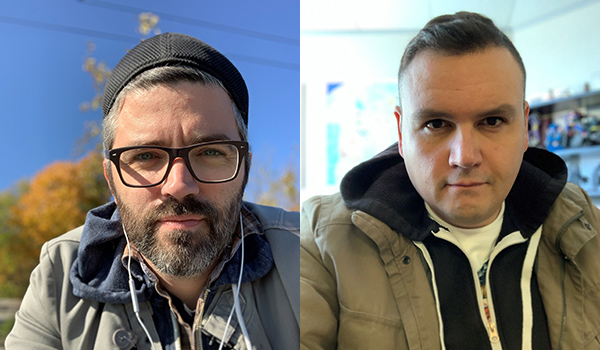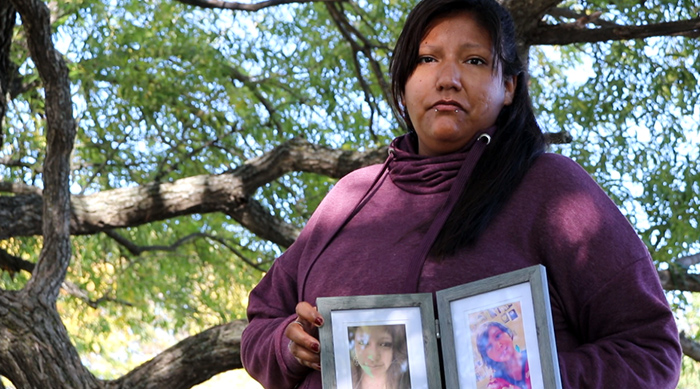2021 Honourable Mention

In 2014, Shania, Arizona and Sacha Bob, three sisters who grew up in the care of the Weechi-it-te-win Family Services, all died by suicide within seven months of each other. APTN reporters Kenneth Jackson and Cullen Crozier were leaked Sacha’s internal death report which launched them on a nine-month investigation that exposed a long list of warning signs and negligence. 39 recommendations had been made in Sacha’s death report and APTN wanted to find out if any had been addressed.
Arizona had 48 foster placements during her care at Weechi, Shania 55. Arizona aged out of care and Shania was allowed to leave voluntarily at age 16. Shania died by suicide less than two years later. Two months after Shania’s death, Arizona also died by suicide. Their remaining living sister, Robyn, says they were abused, lost and defeated. Robyn got to see Sacha one time before she too was discharged from care and took her own life. Sacha was 12.

Canada’s underfunding of First Nations child welfare is well known, but Weechi is a First Nation-run child welfare agency in northwestern Ontario, licensed by the Ontario government. Weechi has operated since 1982 and is purported to be one of the most progressive in the country. The reporters found that Weechi and agencies like it are assuming more and more responsibility each year, and the reality is they also appear to be failing indigenous children.
APTN was the first to report that of the 178 Indigenous children who have died in connection to Ontario’s child welfare system over the last seven years, 147 are tied to First Nations child welfare agencies — or 82.5 per cent.
After working quietly for months gathering documents, speaking to foster parents, children in care and other stakeholders, Jackson and Crozier made their way to northern Ontario. There they found sources who risked their livelihoods, homes and connections to their homelands in order to speak out about their experiences with the agencies.
The reporters were able to gain the trust of their subjects including a 15-year-old boy called ‘Daniel’ who has been in care most of his life. ‘Daniel’ has a congenital shoulder blade deformity that could have been successfully treated when he was young. His medical records prove that Weechi had known about his deformity since he was four years old yet failed to provide him with proper medical treatment.
They met Autumn Windego who grew up in care and took a position as a case worker with Weechi to try to help children like herself. Once inside as a worker, Autumn found the agency was badly mismanaged but the complaints she filed went nowhere. After speaking out, she was threatened with eviction and banishment from Rainy River where she lives with her husband and their three children.
There are more children in foster care today under the customary care model than there were at the height of the residential school era. There has been little improvement in the system since then. Child advocates say the problem is that the model remains the same: it is not focused on prevention and intervention.
After the first stories on ‘Daniel’ were published, Weechi was pressured into taking a more active role in getting him the proper medical treatment needed to hopefully correct his medical condition. By the end of December, a number of families with children in care were reunited and several investigations were launched, including one by the Ontario government investigating every child reported on by the APTN team. Those investigations are still ongoing.
Kenneth Jackson is a crime reporter and television producer in Ottawa, Ont. with nearly two decades in the business. He got his start in community newspapers before joining the Ottawa Sun in 2007 where he worked the police beat. In 2011, Jackson joined APTN to break the Bruce Carson scandal. The former senior aide to Prime Minister Stephen Harper tried using his contacts in the federal government to sign water deals with First Nations. The RCMP would charge Carson with influence peddling based on APTN’s reporting. The case would make it all the way to the Supreme Court of Canada, which upheld his conviction in 2018. In recent years, Jackson has focused, almost exclusively, on the child welfare system in Ontario. He received the 2020 Press Freedom Award (Canadian chapter) for his fight to shed light on systemic injustices. He also received a Michener Award nomination in 2019, as well as a Canadian Association of Journalists award in 2018 for his work.
Cullen Crozier is a video journalist and documentary producer with APTN Investigates. He is Gwich’in, Dene and Métis based out of his home community of Somba K’e, Denendeh (Yellowknife, NT). Cullen’s work focuses on injustices facing Indigenous people in Canada, he has reported on the forced sterilization of Indigenous women in Saskatchewan, the forgotten residential school survivors of Newfoundland and Labrador and the ongoing child welfare crisis in Ontario. His documentaries have been recognized by the Canadian Association of Journalists, Amnesty International, the Native American Journalists Association and the Academy of Canadian Cinema & Television.

